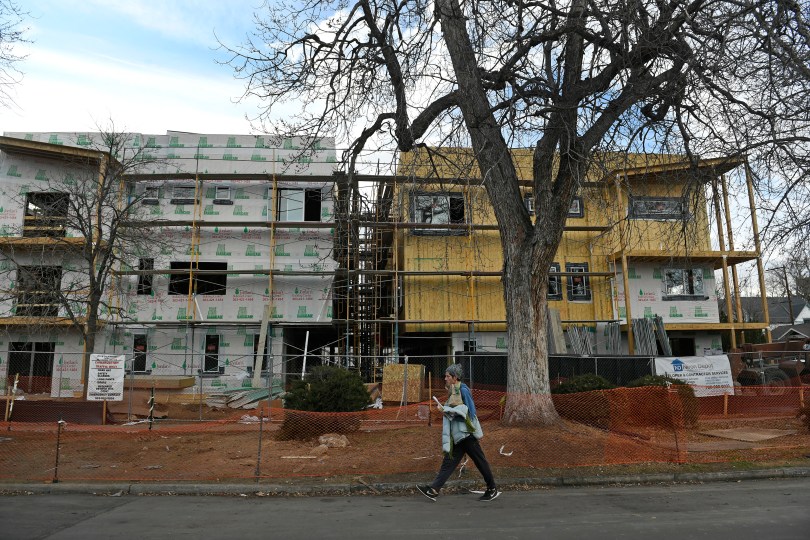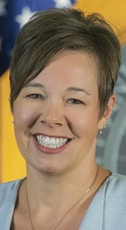
Homes under construction on Vine Street between 19th and 20th avenues in Denver are shown in this 2018 file photo. (Helen H. Richardson/The Denver Post)
Denver City Council members Robin Kniech and Amanda Sandoval have introduced a proposal to overhaul a board in charge of hearing zoning appeals, changing who nominates members and mandating certain professional backgrounds.
If passed, all five current members of the Board of Adjustment for Zoning would be replaced.
The board typically hears appeals regarding minute decisions made by the zoning administrator and the city’s Community Planning Department about things like allowing a wall one foot closer to a property line or authorizing a few more square feet for a home addition.
In recent months, the board has also been thrust into a more hot-button issue as groups of residents have asked it to review the zoning administrator’s decision allowing Denver’s sanctioned homeless campsites.
“We’ve gotten questions about this board, about what other cities are doing and where our current board structure comes from,” Kniech said. “We are looking at all kinds of areas of our land use practices.”
Currently, the mayor appoints all five members of the board.
Kniech and Sandoval’s proposal calls for two members to be nominated by the mayor and two by the City Council. The fifth member would be a joint selection by both.
The proposal also calls for at least one attorney and one member with expertise in architecture, urban planning, construction, engineering or development. Other members would have to demonstrate they have an “interest in land use/zoning.”
The board doesn’t currently have an attorney on it.
According to board technical director Austin Keithler, the board’s current members and their professional backgrounds are:
• Jim Keavney, an architect with his own practice, KSA Architecture
• Penny Elder, who works for the Colorado Department of Regulatory Agencies’ Division of Real Estate
• Frank Schultz, who runs a chain of restaurants under The Tavern Hospitality Group
• Nancy Burkhart, who has “experience as a reporter” and a background in urban planning
• Charlie Young, who has experience as a property management supervisor with the Colorado Department of Transportation
There are two board alternates who only vote when another board member is out.
- Alternate Jose Aguayo has an arts and design background with management and administration experience, but he has been “retired for a number of years,” Keithler said.
- Alternate LeAnn Anderson “has a background with the state government and a history of working with local neighborhood organizations.”
Kniech and Sandoval’s proposal calls for there to continue to be two board alternates.
The proposal also calls for additional training for board members.
Kniech said it wasn’t one case that caused her and Sandoval to recommend the changes. Rather, it was the questions from community members about the board and how it operates. Kniech said during her 10 years on the council, those questions started to pile up.
Some of the trends that other cities across the nation are adopting, according to a presentation given to a City Council committee last week, include having fewer boards or smaller ones with limited scope, requiring professional credentials, and providing more flexible standards for hardships when someone cannot comply with the zoning code.
Kniech said the Landmark Preservation Commission, for example, has members appointed based on specific credentials, with recommendations coming from Denver’s American Institute of Architecture, History Colorado, the city’s planning board and the American Society of Landscape Architects.
The existing board members are to be replaced by June 1, if the ordinance is adopted. Each member would be appointed for a term of five years.
“We just want to have a bigger conversation as a city (about) what is the best process for getting people who need an exception to the building code,” Kniech said.
Kniech told BusinessDen that the board’s composition and duties have not changed since the 1950s and that this is the latest in a series of modernizing the city’s commissions and boards.
The most recent other boards that were reconstructed or retired were the HOST (Housing Stability) Advisors committee and the Sustainability Council.

Homes under construction on Vine Street between 19th and 20th avenues in Denver are shown in this 2018 file photo. (Helen H. Richardson/The Denver Post)
Denver City Council members Robin Kniech and Amanda Sandoval have introduced a proposal to overhaul a board in charge of hearing zoning appeals, changing who nominates members and mandating certain professional backgrounds.
If passed, all five current members of the Board of Adjustment for Zoning would be replaced.
The board typically hears appeals regarding minute decisions made by the zoning administrator and the city’s Community Planning Department about things like allowing a wall one foot closer to a property line or authorizing a few more square feet for a home addition.
In recent months, the board has also been thrust into a more hot-button issue as groups of residents have asked it to review the zoning administrator’s decision allowing Denver’s sanctioned homeless campsites.
“We’ve gotten questions about this board, about what other cities are doing and where our current board structure comes from,” Kniech said. “We are looking at all kinds of areas of our land use practices.”
Currently, the mayor appoints all five members of the board.
Kniech and Sandoval’s proposal calls for two members to be nominated by the mayor and two by the City Council. The fifth member would be a joint selection by both.
The proposal also calls for at least one attorney and one member with expertise in architecture, urban planning, construction, engineering or development. Other members would have to demonstrate they have an “interest in land use/zoning.”
The board doesn’t currently have an attorney on it.
According to board technical director Austin Keithler, the board’s current members and their professional backgrounds are:
• Jim Keavney, an architect with his own practice, KSA Architecture
• Penny Elder, who works for the Colorado Department of Regulatory Agencies’ Division of Real Estate
• Frank Schultz, who runs a chain of restaurants under The Tavern Hospitality Group
• Nancy Burkhart, who has “experience as a reporter” and a background in urban planning
• Charlie Young, who has experience as a property management supervisor with the Colorado Department of Transportation
There are two board alternates who only vote when another board member is out.
- Alternate Jose Aguayo has an arts and design background with management and administration experience, but he has been “retired for a number of years,” Keithler said.
- Alternate LeAnn Anderson “has a background with the state government and a history of working with local neighborhood organizations.”
Kniech and Sandoval’s proposal calls for there to continue to be two board alternates.
The proposal also calls for additional training for board members.
Kniech said it wasn’t one case that caused her and Sandoval to recommend the changes. Rather, it was the questions from community members about the board and how it operates. Kniech said during her 10 years on the council, those questions started to pile up.
Some of the trends that other cities across the nation are adopting, according to a presentation given to a City Council committee last week, include having fewer boards or smaller ones with limited scope, requiring professional credentials, and providing more flexible standards for hardships when someone cannot comply with the zoning code.
Kniech said the Landmark Preservation Commission, for example, has members appointed based on specific credentials, with recommendations coming from Denver’s American Institute of Architecture, History Colorado, the city’s planning board and the American Society of Landscape Architects.
The existing board members are to be replaced by June 1, if the ordinance is adopted. Each member would be appointed for a term of five years.
“We just want to have a bigger conversation as a city (about) what is the best process for getting people who need an exception to the building code,” Kniech said.
Kniech told BusinessDen that the board’s composition and duties have not changed since the 1950s and that this is the latest in a series of modernizing the city’s commissions and boards.
The most recent other boards that were reconstructed or retired were the HOST (Housing Stability) Advisors committee and the Sustainability Council.

